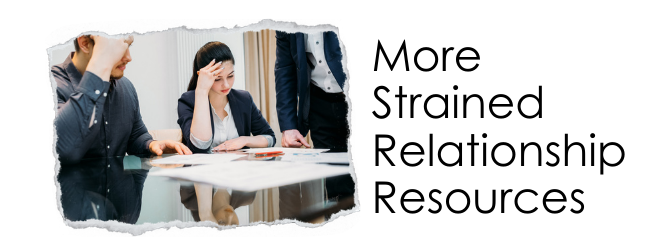
Coaching Can Help You Handle the Many Difficulties of Divorce, so You Don’t Destroy Relationships or Endanger Your Career or Business
The Covid pandemic and lockdown strengthened many relationships. However, it’s also strained many to the point of separation and divorce. Numerous couples ready for divorce in early 2020 had to continue living together because of the virus and the dangers of moving a household. Others could not afford to separate and divorce due to economic hardship.
The line to attorneys and divorce court has increased in recent months as we’ve moved from full lockdown to social distancing and society opening up gradually again.
This article breaks down information and tips for those who are facing a strained relationship that is inevitably heading toward divorce court.
- Understanding what you are experiencing
- Steps to stabilize yourself during a divorce
- Understanding your legal options
- How to become better at negotiating
- Additional resources
In my work as a Business, Career, and Relationship Coach and Strategist, I’ve worked with individuals and couples at all stages of relationships for over 35 years. As someone who has worked on both sides of relationships—coming together and growing apart—I’m a firm believer in gaining perspective on these major life decisions by seeking coaching help. Then if you still decide to end the relationship, do that with help. So you proceed with grace and dignity.
You have to live with yourself and the consequences for the rest of your life, especially if you have children and businesses. And you will always be a family if you have children.
While many couples want coaching and counseling to make their relationship more satisfying, some are so disconnected one or both people are threatening, contemplating, or actively ready for a divorce. While some are angry with their mate for the breakdown or the relationship, many simply feel emptiness. They experience poignant awe at what was once a happy relationship gone awry. They feel hopelessness and a sense of finality they have no control over. For most, it’s a painful decision fraught with self-doubt, disappointment, and regret.

What You Are Probably Experiencing
If you are reading this article, you’re thinking about or anticipating a divorce; whether it is your choice, or not.
- You’ve heard about Collaborative Divorce and if you have to divorce you’d like to do it with the least amount of hostility. You want to eventually heal, and though you may not be able to see it today, you want to have a good life.
- You experience emptiness or anger, as well as huge self-doubts about the life step you’re contemplating and the ramifications it will have on you and so many other people. The consequences and the responsibility feel enormous and overwhelming.
- You feel a great deal of anxiety about the future – because it is unknown. You want the best for yourself and your children, yet your world is being turned upside down. You don’t know how the circumstances will shake out financially, lifestyle-wise, or childcare-wise.
- Not only are you dealing with your sadness and anxiety over the future health and well-being of you and your children, but also you’re also feeling the weight of enormous emotional turmoil, confusion, and fear about another unknown – navigating the legal system that is the route to divorce. You’ve heard so many horror stories about extended battles and outrageous financial costs.

Coaching support and guidance can stabilize your situation during and after a divorce.
Ways to Stabilize Your Situation During and After a Divorce
There are some very basic, simple steps you can take starting now that will help you to stabilize your situation. These steps will help you gain a modicum of control over the choices you need to make and must make in the coming days, weeks, and months. These steps will help you begin to carve out a path of decision-making and wise choices as you go through this major life transition.
- Get Wise Support for Self-Care and Guidance:
Make an appointment with a coach or counselor highly skilled in both relationships that succeed and relationships that end in divorce. This person can help you grieve or go through your anger now, they can also help you walk through the divorce itself, and then rebuild a new life for you and your children. I don’t care if you don’t believe in counseling or you feel too proud to reach out for help. What I do know is that you are going to need such a wise support person to turn to when you are stewing in your own juices or you’ve worn out your family or friends. If you have children, you especially need this support and guidance. It’s too hard to put up a good front all the time, and you want to for the sake of your young ones. You are going to need a strong, objective adult to turn to.
- Get Educated About Your Options and Legal Choices:
I’m a firm believer in knowledge. Knowledge is power. As much as you may fear the inevitable by going to talk to a lawyer, go get educated. Interview one or more lawyers, preferably Collaborative Divorce lawyers. Some Collaborative Divorce lawyers just go this route, and some will also fight for you should you end up in court. You’ve probably been referred to the lawyers at this website or you found them on the net. Pick up the phone. Typically they will give you a free initial consultation so you can hear your options and sense if you might work well together. In the first meeting, you are checking out the relationship capacity of the lawyer, his or her knowledge, and ability to articulate it to you in a way that empowers you.
You want a lawyer who:
- Speaks so you understand what they are talking about.
- Educates you on the various pathways to obtaining your divorce settlement (from what is called the “kitchen table” approach to Mediation, to Collaboration, all the ways to take it to court.)
- Represents your values (e.g. to not litigate or become contentious; to work with your mate for the best outcome for the entire family.)
- Describes your legal options and a step-by-step pathway in the beginning and at each step along the path to your settlement.
- Encourages you to get outside coaching or counseling as needed.
- Helps you create a solid Collaborative Team of consultants (e.g. Neutral Team Coach, Financial and Parenting Specialists) if you choose this path and supports your strengths as you negotiate toward a settlement.
- Read About Divorce and Beyond:
I have clients who devour books when they are going through life transitions, especially difficult ones. It will educate you and keep your mind busy, especially when you are awake and ruminating in the night. You can read more about the Collaborative Divorce process. You can read books about how other people have successfully come through divorce and how they have helped their children through divorce. Such reading will empower you.
- I recommend you go to the International Academy of Collaborative Professionals (IACP) website http://www.collaborativepractice.com/
This site has many testimonials and much information about the collaborative approach from people who have gone through a divorce. The book list is under “RESOURCES” in the left-hand sidebar along with videos and a Divorce Toolkit.
- Become Skilled in Healthy Negotiating:
If you want to eventually return to a peaceful, satisfying life, you want to start practicing now. Especially if you have children together, you and your ex need to know how to negotiate, compromise, and come to agreements. Working through the Collaborative Divorce process is a good training ground for negotiating a settlement. You will be even further along if you study how to negotiate as you enter into your divorce process. Two highly recommended books you will find on the IACP website are
- Ury, William L., Getting Past No, Negotiating in Difficult Situations Bantam (1993),
- Fisher, Roger; Ury, William; Patton, Bruce Getting to Yes: Negotiating Agreement Without Giving In Penguin (1991)
Your coach or counselor may also be able to recommend various techniques and tools to help you negotiate well now, through the divorce, and beyond as you build a life and continue to parent your children together with your soon-to-be-ex.

RELATED ARTICLES
- How a Good Coach Can Help You Manage Resentment in Divorce So It Doesn’t Destroy Your Relationships and Deplete Your Business
- Couple Communication During and After Divorce: Tips To Stay Non-Reactive With Your Ex
- If Divorce Seems Inevitable, Here’s Where to Start
- Appropriate Referrals to an Outside Coach or Therapist in a Collaborative Divorce Process
- How to Survive Living Together, When You Want to Divorce
- The Role of Goal Setting in a Healthy Divorce Process
Additional Resources
When You Are Ready—Reach Out for a Complimentary Call to Explore Your Needs here
